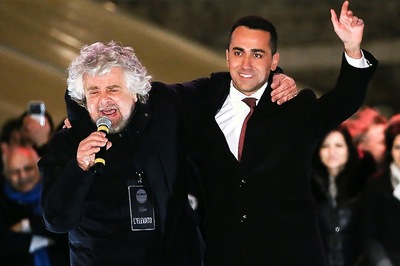
views
New York: Stocks rose for a third straight day on Monday after Google and other companies announced acquisitions totaling more than $19 billion. The return of "Merger Monday" on Wall Street made investors more optimistic about the future. So did a report that showed Japan's economy shrank less than feared following the March 11 earthquake and tsunami. That helped temporarily ease worries about the US economy.
The Dow Jones industrial average rose 113 points, or 1 per cent to 11,383 at 12:02 pm in New York. The Standard & Poor's 500 index rose 14, or 1.2 per cent, to 1,193. The Nasdaq composite index rose 19, or 0.8 per cent, to 2,527.
Markets may have stabilized, but financial analysts warn investors not to assume that stocks have fully settled down after last week's swings. The S&P 500 rose or fell by at least 4 per cent for four straight days, something that hasn't happened since November 2008. The first-ever downgrade of the US credit rating triggered the volatility. It was exacerbated by concerns that Europe's debt problems are worsening and that the US economy is weakening.
"You might have these moments of quiet, but the debt crisis in Europe did not go away," said John Hailer, chief executive officer of Natixis Global Asset Management, which manages more than $700 billion under the Loomis Sayles and other brands. "Our issues with the debt, with what our tax policy is going to be going forward, our unemployment did not go away."
"We are probably going to have to look at some very different levels of volatility than what a lot of investors grew up with over the last 25 to 30 years," he said.
Hailer said investors seeking protection from volatility have poured dollars into mutual funds that bet on falling stock prices and use other alternative strategies. About 20 per cent of all new investment dollars coming into Natixis are for such funds, up from 8 per cent in 2009.
More swings could be on the way this week. The leaders of France and Germany meet on Tuesday to discuss Europe's debt problems. Spain and other countries have borrowed so much that they may need help to repay their bills. Investors on Tuesday will get an update on how Spain's economy did during the second quarter.
On Monday, a spate of corporate deals dominated the news. The biggest was Google Inc.'s $12.5 billion cash purchase of wireless phone maker Motorola Mobility Holdings Inc. It is also the biggest acquisition in Google's history. No 2 was its $3.2 billion purchase of DoubleClick in 2008. Motorola Mobility's stock jumped per cent 56 per cent. Google fell 2.4 per cent.
Among other deals: Time Warner Cable Inc said it will pay $3 billion in cash for Insight Communications Co., which has more than 750,000 cable customers in the Midwest. Agribusiness conglomerate Cargill said it will buy Dutch animal nutrition company Provimi for $2.16 billion. And in the energy industry, offshore driller Transocean Ltd. said it will buy Aker Drilling of Norway for $1.43 billion in cash.
Companies across the United States have accumulated a record amount of cash since the recession ended. They have increased their cash reserves every quarter for more than two years, and businesses in the S&P 500 index had a total of $963.3 billion at the end of March, according to the most recent data from Standard & Poor's.
Investors have been waiting for companies to use some of that cash on acquisitions, dividend increases and stock buybacks. Many financial analysts believe that companies are more confident about the future if they're willing to buy other businesses. So a series of acquisition announcements tends to send stocks higher.
The growing cash hoard has been the result of stronger profits. Companies have kept costs low by being slow to hire. Revenue, meanwhile, is growing, particularly from overseas customers. For the 460 companies in the S&P 500 that have reported second-quarter results, total earnings are up 12 per cent from a year ago.
Some companies are looking to pare back. Bank of America Corp. said it will sell its $8.6 billion Canadian credit-card business to TD Bank Group. The bank will also get out of the credit card business in Britain and Ireland. The deals follow others that Bank of America made to move out of foreign credit cards, and they should help Bank of America improve its balance sheet
Bank of America rose 5.4 per cent, part of a rally for the overall industry. Financial stocks in the S&P 500 rose 2.1 per cent, third-best among the 10 industries that make up the index.
No. 1 was the energy industry, which rose 2.6 per cent. Energy stocks benefited from a rise of $1.64 per barrel in crude oil to $87.02.
Asian and European markets rose earlier Monday after Japan said its economy shrank at just a 1.3 per cent annual rate between April and June. That's less than half the drop that economists expected following the earthquake, tsunami and nuclear crisis that struck the country in March.
Still, investors have more reason to worry about the weak US economy.
Manufacturers in New York told the Federal Reserve they're more pessimistic about future growth. Manufacturing has been one of the country's strongest industries since the recession ended in 2009, but growth began to slow in March. Manufacturing nationwide barely grew in July.
Cosmetics company Estee Lauder Cos. fell 6.8 per cent after it forecast earnings for the upcoming year that were below Wall Street's expectations. It also said its net income rose 72 per cent last quarter on strong sales growth to China, Russia and the Middle East.
Lowe's Cos., the second-largest home improvement retailer, fell 1.4 per cent after said its net income was roughly flat last quarter on a 1 per cent rise in revenue.
















Comments
0 comment